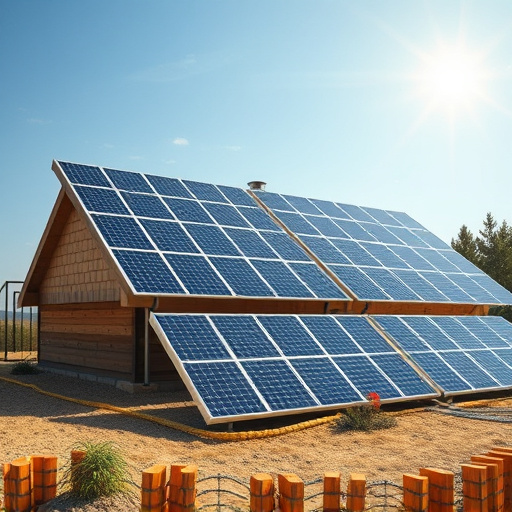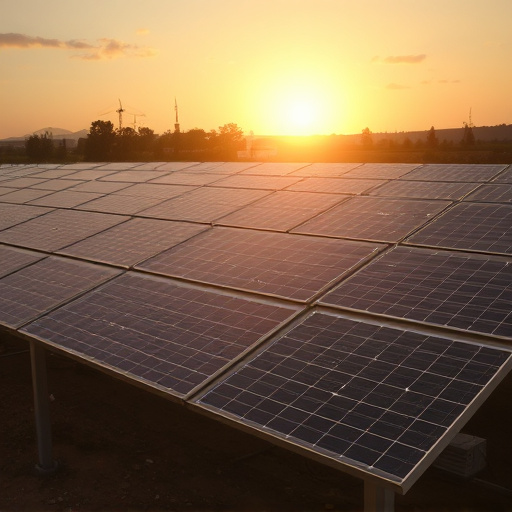Panel recycling depots play a pivotal role in enhancing sustainability within the solar power industry by recycling end-of-life panels, extracting valuable materials like silicon cells, glass, aluminum, and copper, and integrating them into new solar products. These facilities worldwide are transitioning to solar energy, reducing their carbon footprint, operational costs, and contributing to global sustainability goals. By promoting eco-friendly disposal methods and conserving resources, panel recycling fosters a circular economy, aligning with the growing demand for renewable energy sources and addressing the e-waste crisis.
Panel recycling depots play a vital role in promoting sustainable practices by ensuring eco-friendly disposal of solar panels. By utilizing specialized facilities, these depots facilitate the recycling of photovoltaic (PV) materials, reducing waste and minimizing environmental impact. This article explores the crucial function of panel recycling depots, highlighting their contribution to a greener future through innovative solutions like incorporating solar power for efficient, sustainable disposal. We’ll delve into the benefits and positive effects on our planet.
- The Role of Panel Recycling Depots in Promoting Sustainable Practices
- Utilizing Solar Power for Eco-Friendly Disposal
- Benefits and Impact on the Environment
The Role of Panel Recycling Depots in Promoting Sustainable Practices

Panel recycling depots play a pivotal role in promoting sustainable practices within the solar power industry. These specialized facilities are designed to handle the eco-friendly disposal and recycling of solar panels, ensuring that valuable materials can be reclaimed and reused. By implementing robust recycling processes, these depots contribute significantly to reducing the environmental footprint associated with solar energy generation.
Through efficient sorting and processing techniques, panel recycling depots extract critical components like silicon cells, glass, aluminum frames, and copper wires from end-of-life panels. These recovered materials are then redirected for use in manufacturing new solar products, closing the loop on resource utilization. This circular economy approach aligns perfectly with the global shift towards renewable energy sources, as it minimizes waste and conserves natural resources while maximizing the potential of solar power.
Utilizing Solar Power for Eco-Friendly Disposal

Many recycling depots are now embracing renewable energy sources, and one of the most prominent examples is the implementation of solar power. By harnessing the sun’s energy, these facilities can significantly reduce their carbon footprint and contribute to a greener future. Solar panels installed on depot rooftops or open spaces capture sunlight, converting it into electricity that powers various operations, from sorting equipment to lighting systems. This sustainable approach not only minimizes environmental impact but also reduces operational costs over time.
The use of solar power in recycling depots is a powerful demonstration of eco-friendly practices. As the sun provides an abundant and free source of energy, its utilization ensures a more sustainable disposal method. With the growing focus on sustainability, many businesses are adopting renewable solutions, and panel recycling depots are at the forefront of this movement, setting an example for the industry as a whole to follow.
Benefits and Impact on the Environment

Panel recycling depots play a pivotal role in promoting eco-friendly disposal methods, significantly reducing the environmental impact associated with electronic waste. One of the key benefits is their contribution to energy conservation. By recycling solar panels and other electronic components, these facilities minimize the need for raw material extraction, which often involves energy-intensive processes. This approach helps preserve natural resources and lowers carbon emissions, aligning with global sustainability goals.
Moreover, the implementation of panel recycling depots fosters a circular economy by extending the lifespan of valuable materials. Solar panels, once recycled, can be repurposed in new products, further reducing the demand for virgin resources. This practice not only lessens environmental degradation but also stimulates innovation in green technologies. The adoption of such sustainable practices is crucial in addressing the growing e-waste problem and ensuring a greener future.
Panel recycling depots play a vital role in promoting sustainable practices by facilitating eco-friendly disposal of solar panels. By utilizing solar power for energy-efficient recycling processes, these depots significantly reduce environmental impact. The benefits are clear: less waste ends up in landfills, precious materials are reclaimed, and clean energy production is encouraged. This not only contributes to a greener future but also underscores the importance of innovative solutions like solar-powered recycling in the global push towards sustainability.
